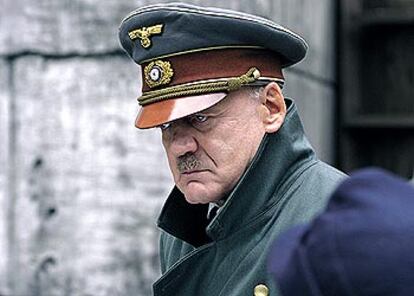80th anniversary of the end of World War II: How does a country fall into the abyss of hatred?
There are still too many unanswered questions, many aspects to be studied, and deep taboos surrounding the most devastating conflict in history

The end of World War II in Europe on May 8, 1945, with the unconditional surrender of Nazi Germany — although in Russia it is commemorated on May 9 — marks its 80th anniversary this Thursday. The conflict left a devastated continent in its wake where, as historian Keith Lowe explains in Savage Continent, “there was no morality, only survival.” In the still-smoking ruins of Europe, as the full extent of the Nazi extermination and concentration camps was being revealed, with millions of refugees and homeless people and millions more dead, one question loomed over all others: how could it have happened? How could it have come to this?
The first investigative books on the conflict were very quick in appearing. Hugh Trevor-Roper, a British intelligence agent sent to Berlin to reconstruct the Nazi dictator’s end, published The Last Days of Hitler in 1947, which became a bestseller. Much of what we take for granted about those final hours in the bunker — brilliantly reconstructed in the German movie Downfall — was revealed then for the first time, although Trevor-Roper suffered a tremendous setback to his reputation when he erred in authenticating the fake Hitler diaries. Robert Harris, the author of Conclave, masterfully recounts that episode in Selling Hitler.
Since then, it is no exaggeration to say that hundreds of thousands of books have been published in all languages, covering every aspect of the conflict. Two of the great contemporary military historians, Antony Beevor with The Second World War (2012) and Max Hastings with All Hell Let Loose (2011), are among those who have dared to write comprehensive histories, and French historian Olivier Wieviorka now joins them with The Total History of the Second World War. The list of recommended books is simply endless.
However, there are still too many unanswered questions, many aspects to be studied, and deep taboos surrounding the war not yet fully explored. Many countries that were victims of Nazism or Stalinism, or both, such as Poland, France, Ukraine, and the Baltics, simultaneously bore enormous responsibility for the Holocaust. Antisemitism was not Hitler’s invention, and many citizens of the occupied countries enthusiastically joined in the extermination. Wieviorka devotes a chapter to this subject entitled “A Racial War?”

In one of the last interviews she gave, in the summer of 2017 at her home in Budapest, the Hungarian philosopher Agnes Heller, a Holocaust survivor who was later persecuted by the Hungarian communist regime, responded thus to the question of whether she thinks she will ever be able to understand how the Holocaust was possible: “It completely eludes me. I wanted to understand two things above all: how is it possible that people felt morally capable of doing that? And how can social and political institutions deteriorate to such an extent that they allow something like that to happen? I’ve never been able to find an answer.” Asked about Hungarian collaboration in the Holocaust — of the one million Jews exterminated at Auschwitz, 400,000 were Hungarian — she replied: “Adolf Eichmann came here with 300 people. The Nazis couldn’t have killed hundreds of thousands of citizens without the help of the Hungarians. There was enormous complicity.” And that applies to too many countries.
How was such hatred possible? How was it possible for the idea that some citizens were inferior to others to become normalized? How was institutional racism tolerated and established? How could a very significant portion of society — and this is something that Raul Hilberg demonstrated in the classic of classics on the Holocaust, The Destruction of the European Jews — participate in the extermination, from those who drew up train schedules, giving priority to convoys that traveled east full and always returned empty, to the officials who identified each citizen by their origin?
In these times, when the far right is once again rampant in Europe and attempts are being made to whitewash fascist regimes like Franco’s in Spain, or even Nazism itself, the question is more relevant than ever. As is another tremendously uncomfortable one: what did the world do, apart from closing its borders to Jews trying to flee? When the Olympic Games were held in Berlin in 1936, with a large international presence, it was impossible to ignore what Nazism was up to, because they had already passed the racist Nuremberg Laws. The persecution of Jews was already a state policy at that time.
An article by Amanda Taub last week in The New York Times entitled The Frightening Precedents for Trump’s ‘Legal Abyss’ recalled a book that has been widely cited lately in the U.S.: The Dual State: A Contribution to the Theory of Dictatorship, by Ernst Fraenkel. Its author was a German Jew who managed to practice law until 1938, when he fled his country because he was certain he would be arrested. His book, a legal classic, argues that in dictatorships many people live as if nothing were happening around them, while others plunge into a world of terror and death. “Fraenkel’s crucial observation,” Taub writes, “was that in a dual state, authoritarianism arrives much sooner for some people than others. Those unlucky enough to fall into the legal abyss would find themselves subjected to uncontrolled state violence, while life continued largely as normal for others.”
Taub continues in her analysis: “Past episodes in American history suggest that the United States — despite its democratic traditions — is vulnerable to the creation of zones of authoritarianism. But history also shows that the zone of legality can strike back. When the country was founded, the liberal legal order applied to European settlers, while Native Americans and enslaved people were subjected to a more authoritarian, violent system. During the Jim Crow era, Southern states operated as single-party authoritarian regimes, permitting or even encouraging extralegal violence like lynching, while participating in democracy at the federal level.”

At its core, it’s a reinterpretation of the famous quote by Lutheran pastor Martin Niemöller, falsely attributed to Bertolt Brecht: “First they came for the socialists, and I did not speak out — because I was not a socialist. Then they came for the trade unionists, and I did not speak out — because I was not a trade unionist. Then they came for the Jews, and I did not speak out — because I was not a Jew. Then they came for me — and there was no one left to speak for me.”
A similar reflection exists in the film Judgment at Nuremberg, Stanley Kramer’s classic about the Nuremberg trials. Burt Lancaster plays Ernst Janning, a fictional jurist of enormous prestige who, nevertheless, was seduced by Nazism — some believe he was inspired by the philosopher Martin Heidegger. He shows complete remorse, and when he is sentenced, he tells the judge, Spencer Tracy: “Those people, those millions of people... I never knew it would come to that.” To which the judge replies, “Herr Janning, it ‘came to that’ the first time you sentenced a man to death you knew to be innocent.”
Could the United States, like some European countries, be at the beginning of a process that could lead to something worse? Do we live in dual states? The Trump administration is daily ignoring habeas corpus, the basic right of every detainee to appear before a judge, and people are being arrested in the street and then disappearing, but, as in the poem, so far none of them have a U.S. passport. Do we in Europe live in dual states because of the way we treat undocumented migrants? The recently released film, Souleymane’s Story, which chronicles 48 hours in the life of an irregular migrant in Paris, clearly shows what it is like to live without rights in the very heart of rights and guarantees that is the EU.
Perhaps the first lesson of the Second World War is that no form of racism is acceptable, and that by the time we realize we’ve lost our freedom, it’s already too late. When Germany’s secret services claimed last week that the far-right AfD party was incompatible with democracy, they drew a red line that many other European countries should reflect on this May 8: “Crucial to our assessment is the AfD’s idea of the people, based on ethnic origins, which devalues entire population groups in Germany and violates their human dignity,” read a secret service statement reported in Marc Bassets’s column in this newspaper. “Its objective,” it specifies, “is to exclude certain population groups from equal social participation with others, to subject them to unequal treatment that is inconsistent with the Constitution, and to assign them a devalued legal status.” The AfD are by no means alone in this. But they haven’t come for us yet.
Sign up for our weekly newsletter to get more English-language news coverage from EL PAÍS USA Edition
Tu suscripción se está usando en otro dispositivo
¿Quieres añadir otro usuario a tu suscripción?
Si continúas leyendo en este dispositivo, no se podrá leer en el otro.
FlechaTu suscripción se está usando en otro dispositivo y solo puedes acceder a EL PAÍS desde un dispositivo a la vez.
Si quieres compartir tu cuenta, cambia tu suscripción a la modalidad Premium, así podrás añadir otro usuario. Cada uno accederá con su propia cuenta de email, lo que os permitirá personalizar vuestra experiencia en EL PAÍS.
¿Tienes una suscripción de empresa? Accede aquí para contratar más cuentas.
En el caso de no saber quién está usando tu cuenta, te recomendamos cambiar tu contraseña aquí.
Si decides continuar compartiendo tu cuenta, este mensaje se mostrará en tu dispositivo y en el de la otra persona que está usando tu cuenta de forma indefinida, afectando a tu experiencia de lectura. Puedes consultar aquí los términos y condiciones de la suscripción digital.









































